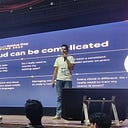CKA | Learnings in my journey!!!
I woke up in the morning and saw this awesome news, smashed the CKA exam in the 1st attempt and the score was 90.
I wanted to share some useful resources that helped me pass the CKA exam and a few tips that can help you prepare and hopefully pass if you are also planning to take it.
I practiced on version 1.16 and the test was on version 1.18 (changed just before a few days of my scheduled exam). That change hardly made any difference. Passing the exam was not possible without Mumshad Mannambeth’s course on Udemy. A BIG THANK YOU for him!!
The CKA exam covers the following topics:
- Application Lifecycle Management — 8%
- Installation, Configuration & Validation — 12%
- Core Concepts — 19%
- Networking — 11%
- Scheduling — 5%
- Security — 12%
- Cluster Maintenance — 11%
- Logging / Monitoring — 5%
- Storage — 7%
- Troubleshooting — 10%
EXAM TIPS
1. Kubectl
Since the CKA exam is 100% practical, you need to make sure you are confident enough with Kubectl. That’s mostly what you will be using during the exam, A lot of useful Kubectl command examples can be found in the Kubectl cheatsheet available in the official Kubernetes documentation.
2. Use an Alias
alias k=kubectlThis means you can now just type “ k” instead of “ kubectl “. It might sound trivial but actually saves you a bunch of time.
3. BASH and VIM
Chances are you’re already familiar with Linux and have used bash or zsh and tools like vim extensively. In that case please skip ahead to the next tip.
5. Slack Community
The slack community1 and community2 helped me a lot. I gained confidence and techniques on the channel.
6. K8 Documentation
On kubernetes.io, you should read the entire exam curriculum and its relevant pages to understand it properly. you are allowed during the test to view the following websites:
7. Troubleshooting
You should learn how to troubleshoot the cluster. When you are on Kubernetes.io, I’d recommend reading the following pages.
8. Practice, Practice, Practice…..
Don’t rush, give yourself time to learn and understand k8. Practice a lot, try to execute by yourself everything you learn in theory. Try to set up a cluster using kubeadm, and then give a try to set up a cluster using the hard way by Kelsey Hightower
7. Exam Day
- Verification — Before the exam, I was asked to present a photo identification that is issued by the government. In most cases, your international passport is sufficient. You can read the Candidate Handbook for more information.
- Room Test — You need to prepare a room for the exam. Your room should be well lit, private, and quiet. I was asked to remove all the books, games put on my desk. The instructor may ask you to show the room and check if you don’t have a webcam.
- Time Management — Save your time and do not waste time on any questionable items avoid any awkward questions. You can spend the remaining time you have on these difficult questions. However, it would be best if you endeavored to attempt all the easy questions first. To pass the exam, you do not have to beat everything. Passing the exam requires scores of at least 74% in the CKA.
- Stable Internet — A stable network is a need, I’m in India and I didn’t go to the exam center. The home network interrupts once wasted some time and I needed to share the desktop and camera again.
- Speed — You have 3 hours to go through the exam, but time flies. If you get stuck during the exam, note down the question number and move to the next one.
Useful Links
The below links have helped me in cracking the exam in the first attempt, Do read it before sitting for the test.
- https://github.com/cncf/curriculum
- https://kubernetes.io/docs/tutorials/kubernetes-basics/
- https://www.katacoda.com/courses/kubernetes
- https://github.com/kelseyhightower/kubernetes-the-hard-way
Don’t worry if anything goes wrong and you fail the exam. it’s hard. but don’t panic. You have got a free retake, use it !! :D. I hope these tips were helpful and may help to some extent.
Originally published at https://www.linkedin.com.
